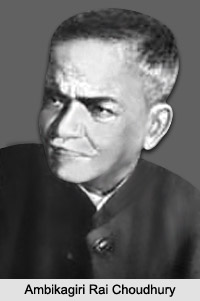 Ambikagiri Rai Chaudhury is a rebellious iconoclast, a progressive thinker and reformist, belongs to the fire brand patriots who rose amidst the sky of Assam literary faculty like a meteor streaking across the known and unknown zones. Such was the genius of Ambikagiri Choudhury, a firefly who initiated and ignited the forest fire in the darkness enshrouding Assam. The fiery idealist that Ambikagiri Roychowdhury was the place he dwelt amidst was idyllic so to say.
Ambikagiri Rai Chaudhury is a rebellious iconoclast, a progressive thinker and reformist, belongs to the fire brand patriots who rose amidst the sky of Assam literary faculty like a meteor streaking across the known and unknown zones. Such was the genius of Ambikagiri Choudhury, a firefly who initiated and ignited the forest fire in the darkness enshrouding Assam. The fiery idealist that Ambikagiri Roychowdhury was the place he dwelt amidst was idyllic so to say.
Early Life of Ambikagiri Rai Choudhury
Two prolonged battles marked the eventful journey of his life`s path: One, his continuous strife against the injustice of personal fate and on the other hand, the oppression of the foreign rulers in national life. In his zeal to free his prized motherland, he ventured to use both pen and sword. The hand that carefully planned a dynamite to murder the British Lieutenant Governor was the creator of a play: Bandi Bharat (Captivated India) too.
Works of Ambikagiri Rai Choudhury
Imaginative choice of words and synonyms is an inbuilt style of Ambikagiri Rai Choudhury (1885-1967). However his prose misses structural balance seldom due to similar temperamental disposition. His writings are calculated medium as well as inspired by socio-political thoughts and ideas. His books include: Jagatar sesh adarsha (1916), Dekadekarir Veda (1942) and Ahuti (1953).
Ambikagiri Raichoudhury was the founder of "Oxom Xongrikhini Xobhaa" and "Oxom Jaatiyo Mohaaxobhaa". His works include "Tumi", "Kaabyo", "Aahuti", "Joydroth Bodh", "Binaa", "Onubhuti", "Bondoo Ki Sondere", and "Bedonaar Ulkaa". He was also the editor of Assamese magazines: "Setonaa" and "Dekaa Oxom". He is also known as "Assam Kesari" as he possessed agitating nationalist nature. He has served as the President of Assam Sahitya Sabha in 1950. He won the Sahitya Academy Award in 1965. Roychowdhury held his views with all the boldness and even bravado of an idealist, and was intolerant when others could not appreciate his point. No matter if his critics called him unschooled or an old fossil. But the oversensitive moralist in the leader broke the enthusiasm completely with a piece of tense criticism in his Deka Asom. It had the caption Artar garbhasrava (The abortion of art), and one can easily imagine what its contents were. In a poem He bhagavan, he bhagavan, written in 1963, he makes quite an urgent appeal to God to put an end to the brave new world of artists for he finds in them only immorality and averseness to work.
Time has crossed its own cyclical order of change and renewal; so has this son of the soil placing himself like the immortal star, but his ideals, dreams of the resurgent Assam has got imprinted on the minds of the thousands of fellow countrymen.
Ambikagiri caught the imagination of the country`s youth with his perennial youth. He had his views on everything around him and gave them out in the stiffest language. But we found that he was not so very stiff and could soften and melt when the understanding heart was near him. Spreading out some point of view in course of the walks, he would stop very abruptly as his thought current reached a check at seeing someone riding a bicycle after dusk without a lamp or an Assamese belle putting on a sari in place of a mekhela and a cheleng (for the latter were considered to be a criterion of Assamesehood). He attended sittings of the Gauhati ASL Club (now liquidated by wiser people) very regularly, for that gave him the opportunity to measure the mind of the country`s youth: and would make a strong protest when a bargeet was executed poorly or in a wrong measure. Youthful as we were, we would challenge him on this just to make him agree to take up the gauntlet and give us a full-length talk on musical aspects of bargeets.
World War-II engaged him very seriously about the fate of Man. There was hardly any scope from war as the small earth would ever be able to contain the fast growing human race and the equally expanding national motives. So the way out is the way to the other members of the solar race, the Mars and the Moon. This solution, very easy as a poetical proposition, he gave out very boldly indeed in the form of an essay Jagatar Ses Adarsa Aru Visyavyapi Mahasanti-Sthapanar Upay in 1916 and a poem Manav Jivanbar Rup, in 1929. Looking back on this and also looking at the Soviet and American travellers of space today, one would find in Roychowdhury a seer imbued with a prophetic vision not ready to be dismayed by the impossible.
Roychowdhury was known to the outside world - particularly to the Kolkata papers as an arch enemy of Bengal and the Bengalis. But his first and pure love, Indumati, who was as Shelley`s Emilia Viviani to his brilliant poetry, belonged to that race of people whom he is supposed to hate and only hate. When in 1960 the Bengalis of Guwahati were scared for their lives, he provided very warm asylum to his Bengali neighbours, who never sustained the slightest scratch on their skins. With an apparent rough outside, Ambikagiri wore a heart of softness, warmth and affection for all. Now that his rough outside is no more, his softness, warmth and affection will surely live with one and all forever.



















